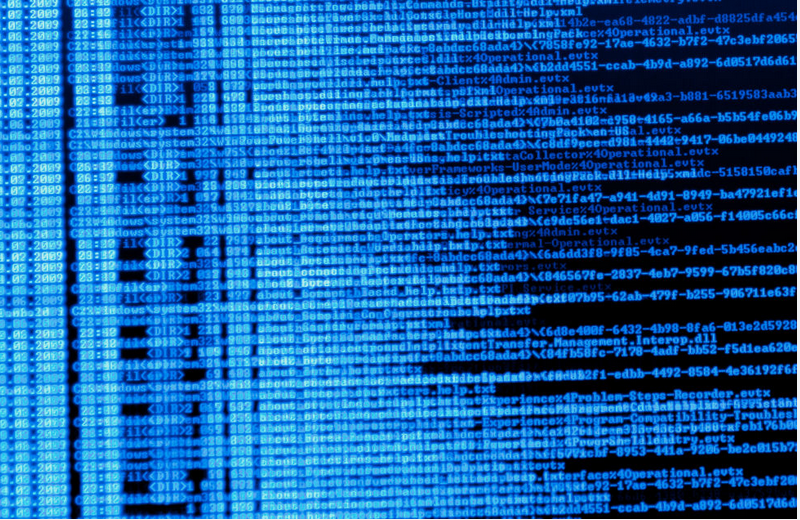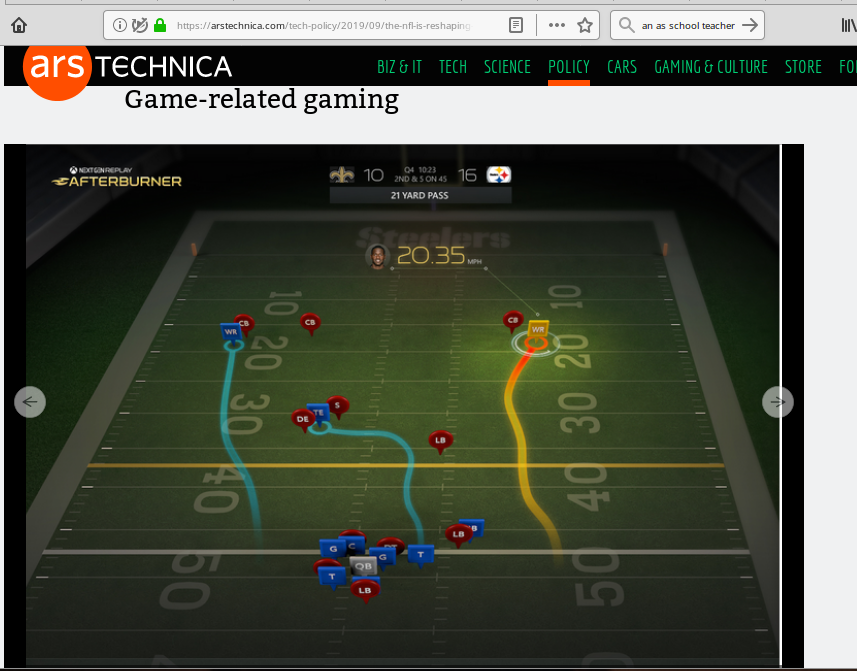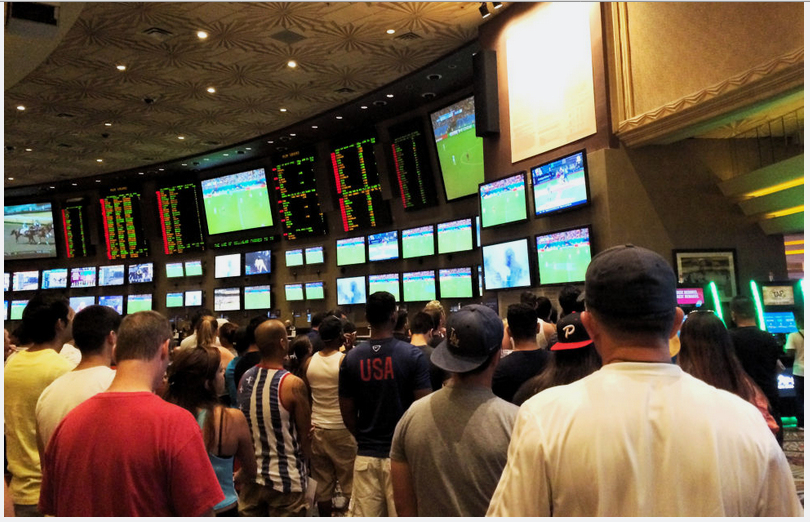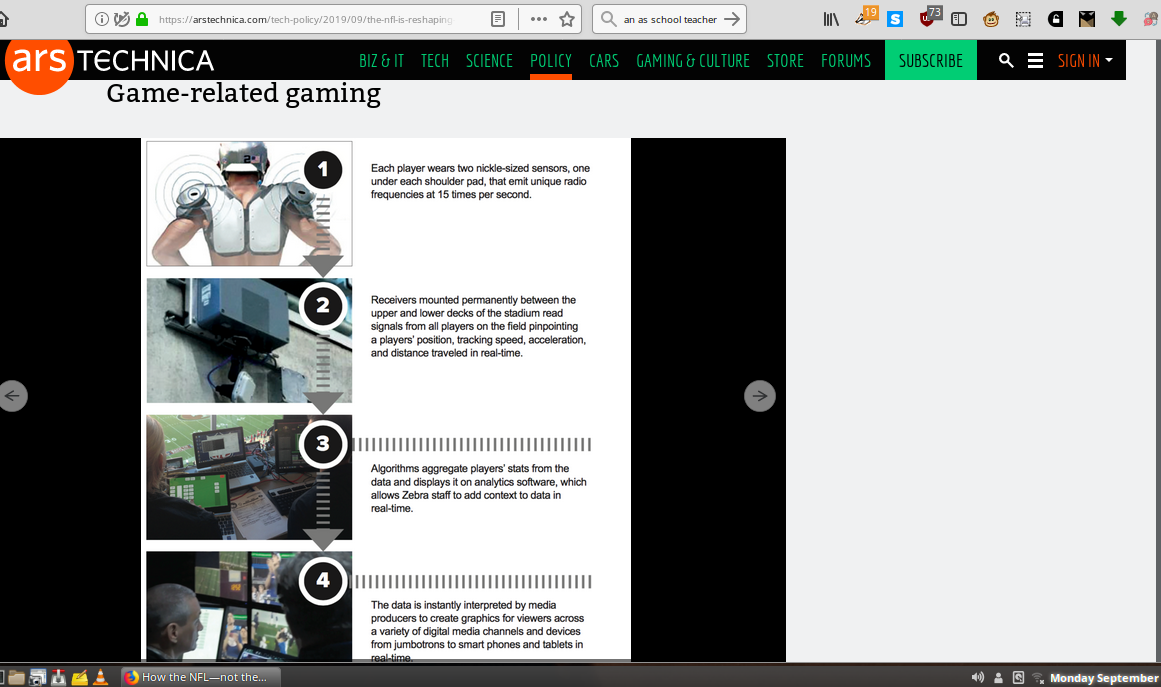From the archives: Corporations watch the NFL using RFID tags to track player movements.
https://arstechnica.com/tech-policy/2019/09/the-nfl-is-reshaping-the-surveillance-society-xbox-one-experience-and-gambling/
SANTA CLARA, Calif.—As guards were going so far as to check inside NFL fans' wallets as part of routine security measures before a recent preseason game at Levi's Stadium, a different form of surveillance was taking place on the inside of the San Francisco 49ers' one-year-old, $1.3 billion home here in Silicon Valley.
We're not talking about facial recognition devices, police body cams, or other security measures likely zeroing in on fans. Instead, employees from San Jose-based Zebra Technologies had recently finished scanning the NFL uniforms of the 49ers and of their opponents—the Dallas Cowboys. All of a sudden, an on-the-field de facto surveillance society was instantly created when Zebra techies activated nickel-sized Radio Frequency Identification Device (RFID) chips that were fastened inside players' shoulder pads. Every movement of every player now could be monitored within an accuracy level of all but a few inches.
On its surface, this seems pretty innocuous. Cameras already track things like total player movement in sports, allowing teams to better recognize tendencies or gauge the physical toll on players. RFID chips, however, can provide more accurate, more granular information along these lines. The NFL's new real-time player tracking data—including things such as player speed and team formations—undoubtedly promises to reformat the game in terms of fan participation, team practicing methods, and potentially game-time strategy.
There's a larger story playing itself out as well. The league's RFID initiative may push far beyond the gridiron.
That's because this so-called geo-fencing technology has a geekier side, and it will likely recast things like fantasy football, the Microsoft's Xbox One experience, and perhaps even the Madden NFL video game produced by Electronic Arts. What's more, the technology potentially opens up new proposition gambling bets in Las Vegas sports books or other gambling venues. But its most unexpected impact will have nothing to do with sports at all. Fortune 500 companies are watching the NFL closely, examining how they might incorporate the RFID chip to monitor every move of their onsite employees from the construction site, the office, and beyond.
Game day
Starting this week, this is the first NFL season in which all NFL stadiums are outfitted with cigar-box-sized receivers across the venue to triangulate the players' movements. These devices can track the players from up to 1,000 feet away, and at Levi's Stadium, there are 20 of these receivers. Players and the field officials are tracked at least 15 times a second. The technology can even tell which way a player is facing in real time.
For now, the ball isn't being tracked like it was in World Cup soccer matches last year. The NFL test-tracked the pigskin in last year's Pro Bowl (the NFL equivalent of an all-star game), but American football isn't like soccer. If the ball crosses the goal line in soccer, it's a goal. In the NFL, action is dead and spotted wherever the ball is being carried when the ball carrier's knee hits the ground when tackled. So while the NFL has instant replay to help officials, it isn't about to automate or dehumanize the game's officiating any further.
Further Reading
For the first time, sensors and a computer play umpire in a pro baseball game
"We're not looking to replace officials with robots," Matt Swensson, the NFL's senior director of emerging technology, told Ars.
According to Zebra, here's the data being tracked in real time:
Player participation.
Player groupings.
Play formation and route running.
Player speed.
Player separation from another player.
Yards player ran in a game, yards run before and after catch, yards run by quarter. Virtually an unlimited variety of relevant distance data in real time.
And here are all the technical specifications (PDF) https://cdn.arstechnica.net/wp-content/uploads/2015/09/ZEBRA-SPORTS_DATA_SHEETS_FINAL.pdf of Zebra's player tracking system and servers.
"Basically, we can take all of the specifics that are tracked in a game and automate them," Jill Stelfox, a Zebra general manager, told Ars. So in total, 2 to 3 gigs of data are generated per game under the current operation. However, the NFL for the moment is keeping most of the data under lock and key—and won't even disperse it among the league's own teams.
"Right now we’re still working through the proper distribution model of the data. We’re not just handing it over to the clubs to go through," the NFL's Swensson said.
Why keep everything centrally? It's a combination of preparedness and competition. If the data is provided in real time to coaches during a game, that could influence the outcome, Swensson said. Coming up with the appropriate distribution channels and security measures for such a setup will require time and energy, and the NFL isn't ready to go to that stage yet.
"Ultimately, we want the game to be fair and balanced," Swensson said. NFL teams can take advantage of this surveillance during practice. Only three teams currently do, according to Zebra's Stelfox: the 49ers, Detroit Lions, and New Orleans Saints.
Sean Payton, the Saints' head coach, said it only makes sense to surveil practices via RFID.
"For us it is distance, workload, travel, all of those things. Zebra has been great to work with. We think it is helpful for us to monitor workload," Payton said on the Saints' website. He said he is able "to look for the exceptions when you are studying numbers. You are able to study and see maybe something that is unusual that stands out." For example, Stelfox told us a story about Zebra's technology discovering that running back Reggie Bush, now of the 49ers, was running about 7 to 8 miles per practice.
"Why practice at that level? You can burn out," Stelfox said.
Stelfox showed Ars some of the real-time data generated during last year's Super Bowl on condition that it not be published. Looking through information collected, you could easily determine that when a certain player lined up in a certain spot, he was almost guaranteed to get the ball. So while top-level game film and old-school coaching could catch that, so does the Zebra technology—and it does so instantly.
"It's super valuable data," Stelfox said.
For now, fans watching on television will be some of the primary beneficiaries of the NFL's great data experiment. Broadcasters can instantly get a limited amount of real-time data to provide viewers—like how far and how fast a player ran and the route taken.
But by making even this tiny of a fraction of data public, there are grand implications. Primarily, this effect will most quickly be felt digitally—things like Xbox One, wagering, and even fantasy football. The NFL app on Microsoft's Xbox One, for example, will immediately take advantage of what Zebra and the NFL are calling the Next Gen Stats program.
As Polygon describes the app on the Xbox One:vault tec vault boy
The app will pair replays with virtual overlays that allow users of the NFL app to see exactly how a play went down, from the snap to the whistle. All 22 players on the field are represented with icons indicating their position, and lines show the paths of key participants in the play. The replay plays in a small window in the upper right corner of the screen, and the virtual diagram of the play animates along with the video.
The app will rank players in a so-called "Afterburner" category that details the fastest players of the week. There's also going to be a "Scrambler" category that tracks how many yards quarterbacks run around before throwing passes. Users of the NFL app will get to vote, for example, on who they think will be the fastest player of the week. And Xbox One users can then win prizes. This year, the top weekly pickers can win memorabilia and possibly a trip to the Super Bowl—the NFL's championship game.
The NFL's RFID influence won't necessarily end there. Going forward, Electronic Arts, which produces the popular Madden NFL video game, is mulling whether Zebra's data would be useful for future iterations of the video game. For example, the game's infamous player ratings could have even better data to grow from. Brad Hildebrand, an EA spokesman, told Ars in an e-mail that "we're always interested in advances like this and will definitely be keeping our eyes on it moving forward."
Enlarge
Flickr user: Daniel Ramirez
The big question for gaming at large, however, has nothing to do with a console. Sports betting is always a topic when it comes to NFL football. NFL wagering all season long is a cash cow for the casinos in the sin city of Las Vegas and elsewhere. Eventually, wagering on the stats Zebra is producing will be offered at sports books, according to experts.
"The more real-time stuff you can bet on, the more it will attract betting worldwide," Ken Adams, the founder of the Nevada Gaming Almanac and executive editor of CDC Gaming Reports, told Ars.
One of the biggest gambling days of the year, at least in the US, is Super Bowl Sunday. Vegas casinos, for example, offer what are known as proposition bets on hundreds of different Super Bowl scenarios. You can place money on things as small as who will win the opening coin toss, who will score the first touchdown, and who will fumble the ball first. With new data available, the amount of prop bets will grow. And depending on how adopted this new information becomes, it could seep into gamblers' weekly routines. Soon, Adams said, "You will be able to wager—over and under—how fast he ran for a touchdown."
Such a proposition bet in this scenario might ask the bettor how fast will the player have run for the game's first touchdown. The oddsmaker would have set the line at a certain miles-per-hour speed, and the bettor would wager money on whether the player who scored that touchdown came in under that set MPH or over it. "There's all kinds of possibilities. It could be a major part of wagering," Adams said.
Adams could even foresee the incorporation of MPH and other new RFID-based stats into the ever-popular fantasy sports. After all, fantasy sports is simply when gamblers or non-bettors alike compete based on the stats of their drafted NFL players. Add more potential stats—yards covered (not earned) in total, number of players to break a certain speed threshold, etc.—and fantasy players get more options for how they operate their leagues. "This data will be widely popular in fantasy sports," Adams said.
Peekaboo
Enlarge
Flickr user: Kjetil Korslien
While only in its infancy, the most interesting—and potentially wide-reaching—implication of the NFL's RFID trials has nothing to do with the game at all. Surveillance at large has been a major topic of discussion in the wake of the Edward Snowden revelations, but employers have long been interested in the tiny actions of their employees in order to maximize investment and efficiency. In fact, as recently as May, we saw companies firing workers who refused to buy in to a 24-hour surveillance system.
Further Reading
Worker fired for disabling GPS app that tracked her 24 hours a day [Updated]
Today, nobody doubts that keystrokes and Internet surfing are common areas for employers to monitor their employees. Video cameras, too, are increasingly common in the workplace as are GPS devices on employer tools like off-site delivery trucks. But just like the RFID tags on the NFL players (and they're also being used in a limited basis in NASCAR and soccer) implementing these tags in everyday work spaces could tell employers where, down to the inches, employees are onsite. Obviously, if the employee isn't on the geo-fenced grounds, the system would note that too.
RFID-enabled surveillance is already happening in small doses. Boeing, for example, uses Zebra's tech to monitor the movements of its workforce painting airplanes. The US Department of Agriculture is requiring RFID chips to monitor commercial livestock. Hospitals employ the technology to track medical equipment. And schools across the country have been demanding students to wear these devices around their necks as well.
Consumers aren't immune to this type of tracking either. Disney World offers a waterproof MagicBand wristband that has an RFID chip in it. Beyond traffic flow monitoring, it unlocks resort hotel doors, gets patrons through entrances, and can be used to pay for merchandise and food. The RFID chip has also become a part of passports, library cards, and other payment cards. One day, the bulk of consumer goods are likely to have these inexpensive chips instead of barcodes.
Consulting firm Gartner works with Fortune 500 companies and sees great promise in Zebra's technology, at least insofar as the workforce is concerned. Mark Hung, a Gartner vice president who examines the Internet-of-things space, says he is closely watching Zebra's NFL tech to see how it can be used to track "workers on and off" a job site and whether "equipment has moved on or off."
"Location technology has now advanced to this point," Hung told Ars. "This is a much more flexible and advanced version of the time card."
When Ars attended the 49ers and Cowboys pre-season game for this piece August 23, Hung was a surprise fellow fan in attendance. However, he said he was at Levi's Stadium not for the football, but for the research. He was gathering information about the Zebra technology to report back to his clients. "This is a proof point that, perhaps, they should pay more attention to," he said.
While 2015 may not go down in NFL history as the turning point for the league's inevitable data explosion, it's already obvious that the data Zebra is collecting is just too valuable for the league to sit on forever. Most likely it will become available in real time, perhaps down the road in just a few years. Along the way, this data will forever reformat the NFL game and potentially how society both surveils and games—whether for fun or money. You can bet on that.
Promoted Comments
Pit SpawnArs Praetorian
jump to post
I bet the patriots would just love to get the RFID data of their opponents...
538 posts | registered Feb 28, 2009
The big question for gaming at large, however, has nothing to do with a console. Sports betting is always a topic when it comes to NFL football. NFL wagering all season long is a cash cow for the casinos in the sin city of Las Vegas and elsewhere. Eventually, wagering on the stats Zebra is producing will be offered at sports books, according to experts.
"The more real-time stuff you can bet on, the more it will attract betting worldwide," Ken Adams, the founder of the Nevada Gaming Almanac and executive editor of CDC Gaming Reports, told Ars.
One of the biggest gambling days of the year, at least in the US, is Super Bowl Sunday. Vegas casinos, for example, offer what are known as proposition bets on hundreds of different Super Bowl scenarios. You can place money on things as small as who will win the opening coin toss, who will score the first touchdown, and who will fumble the ball first. With new data available, the amount of prop bets will grow. And depending on how adopted this new information becomes, it could seep into gamblers' weekly routines. Soon, Adams said, "You will be able to wager—over and under—how fast he ran for a touchdown."
Such a proposition bet in this scenario might ask the bettor how fast will the player have run for the game's first touchdown. The oddsmaker would have set the line at a certain miles-per-hour speed, and the bettor would wager money on whether the player who scored that touchdown came in under that set MPH or over it. "There's all kinds of possibilities. It could be a major part of wagering," Adams said.
Adams could even foresee the incorporation of MPH and other new RFID-based stats into the ever-popular fantasy sports. After all, fantasy sports is simply when gamblers or non-bettors alike compete based on the stats of their drafted NFL players. Add more potential stats—yards covered (not earned) in total, number of players to break a certain speed threshold, etc.—and fantasy players get more options for how they operate their leagues. "This data will be widely popular in fantasy sports," Adams said.
Peekaboo While only in its infancy, the most interesting—and potentially wide-reaching—implication of the NFL's RFID trials has nothing to do with the game at all. Surveillance at large has been a major topic of discussion in the wake of the Edward Snowden revelations, but employers have long been interested in the tiny actions of their employees in order to maximize investment and efficiency. In fact, as recently as May, we saw companies firing workers who refused to buy in to a 24-hour surveillance system.
Today, nobody doubts that keystrokes and Internet surfing are common areas for employers to monitor their employees. Video cameras, too, are increasingly common in the workplace as are GPS devices on employer tools like off-site delivery trucks. But just like the RFID tags on the NFL players (and they're also being used in a limited basis in NASCAR and soccer) implementing these tags in everyday work spaces could tell employers where, down to the inches, employees are onsite. Obviously, if the employee isn't on the geo-fenced grounds, the system would note that too.
RFID-enabled surveillance is already happening in small doses. Boeing, for example, uses Zebra's tech to monitor the movements of its workforce painting airplanes. The US Department of Agriculture is requiring RFID chips to monitor commercial livestock. Hospitals employ the technology to track medical equipment. And schools across the country have been demanding students to wear these devices around their necks as well.
Consumers aren't immune to this type of tracking either. Disney World offers a waterproof MagicBand wristband that has an RFID chip in it. Beyond traffic flow monitoring, it unlocks resort hotel doors, gets patrons through entrances, and can be used to pay for merchandise and food. The RFID chip has also become a part of passports, library cards, and other payment cards. One day, the bulk of consumer goods are likely to have these inexpensive chips instead of barcodes.
Consulting firm Gartner works with Fortune 500 companies and sees great promise in Zebra's technology, at least insofar as the workforce is concerned. Mark Hung, a Gartner vice president who examines the Internet-of-things space, says he is closely watching Zebra's NFL tech to see how it can be used to track "workers on and off" a job site and whether "equipment has moved on or off."
"Location technology has now advanced to this point," Hung told Ars. "This is a much more flexible and advanced version of the time card."
When Ars attended the 49ers and Cowboys pre-season game for this piece August 23, Hung was a surprise fellow fan in attendance. However, he said he was at Levi's Stadium not for the football, but for the research. He was gathering information about the Zebra technology to report back to his clients. "This is a proof point that, perhaps, they should pay more attention to," he said.
While 2015 may not go down in NFL history as the turning point for the league's inevitable data explosion, it's already obvious that the data Zebra is collecting is just too valuable for the league to sit on forever. Most likely it will become available in real time, perhaps down the road in just a few years. Along the way, this data will forever reformat the NFL game and potentially how society both surveils and games—whether for fun or money. You can bet on that.

https://arstechnica.com/tech-policy/2015/05/worker-fired-for-disabling-gps-app-that-tracked-her-24-hours-a-day/





